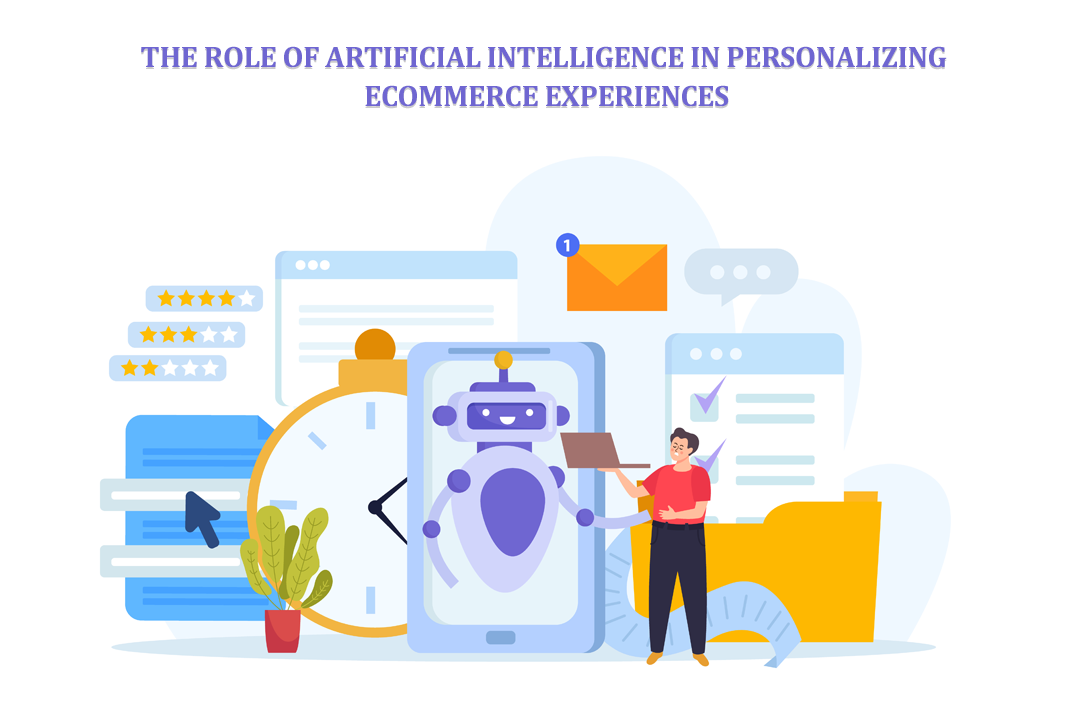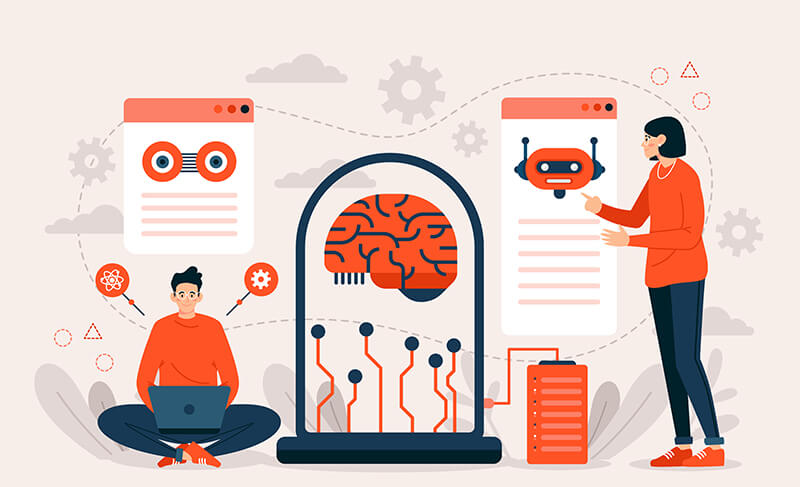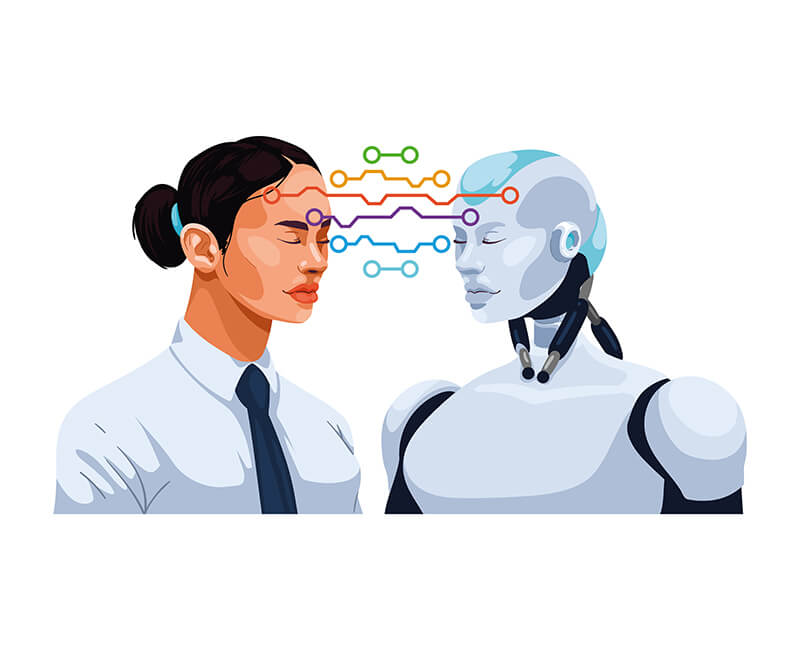The ecommerce landscape is experiencing a metamorphosis fueled by rising customer expectations and the emergence of advanced technologies. One such technology transforming the ecommerce realm is Artificial Intelligence (AI). It enables businesses to cater to individual customer needs and preferences with hyper-personalized experiences. The intelligent tailoring and near-psychic anticipation of customer needs lead to casual browsers being converted first into customers and then into loyal brand advocates.
This article will discuss the power of AI in personalization, the benefits of such personalizations, and some challenges and considerations involved in using AI to personalize the ecommerce experience.

The Power of AI in Personalization
Imagine browsing an online store where product recommendations evolve with each click, seamlessly reflecting your changing desires. Think of receiving targeted offers that arrive before you even realize your interest. This is what you offer your customers when using AI for personalization.
Data is Lifeblood
AI is excellent for personalization partly due to its ability to analyze vast datasets to glean valuable insights. It meticulously goes through browsing history, purchase patterns, demographics, and social media data. Powerful tools like machine learning and natural language processing (NLP) are available to AI to extract hidden patterns and unveil the intricate tapestry of each customer. This is the foundation on which you can build personalized experiences for your customers.


Understanding the Customer Psyche
Armed with this data-driven intelligence, AI models transform into skilled customer wranglers. They delve deep, crafting detailed customer profiles that include preferences, purchase triggers, and potential churn factors. It’s like peering into the customer’s mind, anticipating their next move, and understanding what makes them tick. This in-depth customer knowledge unlocks many possibilities.
Targeted Interventions
Now, let’s translate these insights into action. AI has different types of personalization techniques:
- Product Recommendations: Forget generic product recommendations and offer your customers relevant product data and product offerings based on their data and real-time trends. For example, you can prominently display a limited-edition sneaker alongside perfectly complementary accessories.
- Dynamic Content Customization: Let every visitor to your website experience a unique website. AI tailors website visuals, banners, and offers to reflect individual preferences. Imagine fitness enthusiasts being greeted with workout gear ads and protein shake promotions. At the same time, home decor enthusiasts discover curated furniture collections on the homepage.
- Personalized Search: With this, your customers won’t need to wander online aimlessly. AI-powered search refines results based on past behavior and product affinities. Using personalized search, a vague “cozy sweater” query results in a selection of soft knits perfectly aligned with the shopper’s taste.
- Chatbots and Virtual Assistants: Say goodbye to robotic customer service encounters. AI-powered chatbots offer personalized support and recommendations in real time. It’s like having a dedicated guide who understands the customer’s style, answers questions about sizing, and suggests matching accessories.
- Dynamic Pricing and Promotions: Let price tags become fluid with AI tailoring discounts and offers based on customer segments and purchase likelihood. Loyal customers receive exclusive deals on their favorite brands, while first-time visitors are enticed with targeted welcome discounts. It’s a win-win scenario, fostering customer loyalty and optimizing business conversions.
Benefits of AI-Powered Personalization
AI-powered personalization attracts ecommerce owners with the various benefits it offers. In this section, we’ll delve into the advantages provided to online store owners.
Fraud Detection and Prevention
AI has shown a remarkable ability to detect and prevent fraudulent activities. It can easily detect fraud by leveraging behavioral and predictive analytics to identify anomalies and patterns. It prevents malpractice and ensures security with biometric authentication, natural language processing, and geospatial analysis. Moreover, real-time monitoring and continuous learning enhance adaptability, making AI an indispensable ally in safeguarding against deceitful activities.


Inventory Management
AI transforms inventory management by analyzing sales data, predicting demand, and ensuring businesses operate flawlessly. It keeps optimal stock levels optimized and prevents both stockouts and excess inventory. AI provides real-time visibility by enabling accurate order fulfillment and return management. Furthermore, it also aids in avoiding obsolescence, ensuring businesses maintain a lean and efficient inventory system.
You can also use plugins like the WooCommerce Stock Manager to manage inventory.
Customer Churn Prediction
AI serves as an essential tool in predicting and reducing customer turnover. It employs early identification of at-risk customers by analyzing behavior patterns. Timed identification of churn indicators and the deployment of automated alerts enable proactive responses from the AI detectors. In addition, dynamic pricing, incentives, and lifetime value prediction enhance customer loyalty, which are crucial factors of Customer Churn Prediction (CCP). Integration with Customer Relationship Management (CRM) ensures continuous refining of predictive models.


Enhanced Customer Engagement
AI offering customers proactive assistance and personalized product suggestions and content means that they’ll be instantly captivated. This leads to heightened customer engagement and deeper exploration.
AI also plays a role in creating a frictionless customer journey. Frictions like abandoned carts, confusing checkout processes, and missed opportunities are all identified and eliminated, streamlining the purchase path. It does this with intuitive interfaces, personalized nudges, and relevant incentives. The result is a smooth, harmonious cadence towards conversions, maximizing business potential.
Boosted Conversion Rates
AI will act as a virtual guide on the customer journey, nudging customers towards conversion. Personalized recommendations address specific needs and desires, eliminating the overwhelming feeling of endless options. Dynamic pricing strategies tailored to individual preferences make offers feel fair and enticing. AI-powered chatbots answer questions and resolve issues in real time, smoothing out the buying journey and leading to happier, more likely-to-convert customers.


Increased Customer Loyalty
Loyalty isn’t built on generic marketing blasts; it thrives on individual connections. AI helps you remember your customers, their preferences, and their purchase anniversaries. Personalized birthday or anniversary offers, exclusive early access to sales, and targeted loyalty programs make customers feel valued and appreciated. These interactions foster a sense of belonging and turn transactional relationships into genuine connections, creating brand loyalty that translates into repeat business and positive word-of-mouth.
Enhanced Brand Reputation
In today’s hyper-connected world, word travels fast. When customers encounter experiences that feel tailored to them, they take notice, and they share. AI-powered personalization fuels positive brand perception. Customers feel understood, their needs anticipated, and their preferences respected. This makes for positive reviews, social media buzz, and a reputation for being a brand that goes the extra mile for its customers.

Challenges and Considerations
While the benefits of AI-powered personalization are undeniable, they are not without their challenges. As ecommerce store owners embrace this powerful technology, they must also tread carefully and address critical considerations to ensure ethical and responsible implementation. In this section, we’ll focus on some essential hurdles to navigate.
Personalization thrives on data, but data privacy concerns loom large. Customers are increasingly wary of how their information is collected, stored, and used. Transparency is crucial, so you need to communicate your data collection practices clearly, outline user control mechanisms, and prioritize robust security measures. Remember, trust is your most valuable asset, and building it requires an unwavering commitment to data privacy.
AI algorithms are only as good as the data they are trained on. Biases present in that data can be unintentionally perpetuated, leading to discriminatory recommendations, pricing, or search results. You can mitigate this risk by actively seeking diverse data sets, regularly auditing algorithms for bias, and implementing human oversight mechanisms. It’s essential to keep in mind that fairness and inclusivity are not just ethical imperatives; they are also critical to building a solid and loyal customer base.
Personalization is a powerful tool, but wielding it with nuance is crucial. Overly invasive or intrusive personalization can backfire, creating a sense of unease or creepiness. You must strike a balance by focusing on relevant recommendations, respecting user privacy boundaries, and offering opt-out options. Customers appreciate genuine connections, not forced intimacy.
Conclusion
In conclusion, AI tools provide retail businesses the ability to gain analytical insights and gather data necessary for understanding their customers. This information helps in making well-informed business decisions and leads to an enhanced customer experience and optimized operations.
As a result, the integration of artificial intelligence in e-commerce allows stores to maximize their product offerings, increase conversion rates, and boost sales. The analytical capabilities of AI enable businesses to comprehend customer behavior, preferences, and trends, allowing e-store owners to tailor strategies that comply with their target audience.



